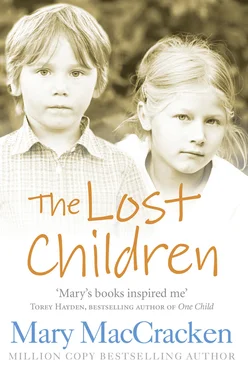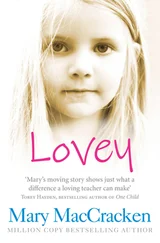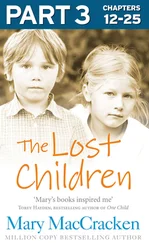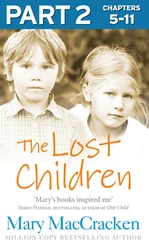I was assigned to work with Renée when I went back, and for the first time I learned what bad teaching was. She was young and pretty with teased blond hair; but instead of the happy, confident security I had come to take for granted as the school’s atmosphere, there was a tight, brittle tension in Renée’s room behind what she called “permissiveness.” I watched her narrow hands clench and her voice rise as she refilled the bathtub of water she kept in the center of the room; time and time again the children dumped it over with shrill laughter.
Her theory of permissiveness, she explained, was one that was used with great success in Canada. She felt that all emotional disturbance stemmed from the same source: the fact that the child had never been accepted by his parents. So before he could grow up, he must be allowed to be a baby and do the things he had wanted to do. Renée brought with her pink tin playhouse equipment – stove, refrigerator, sink. I was not quite sure how these fitted into her theory, but I know that my major contribution to her class that fall was the lugging of stove, refrigerator, sink, and bathtub back and forth on Fridays and Mondays.
I was not happy working in that room. All day long the children destroyed things. “They are getting the hate out of their systems,” Renée would say; but if they were, they did not seem any happier for it. They whined and cried and lay on the floor, cold and wet with bath water and urine.
Just before Christmas vacation I spoke to the Director, asking to be transferred to another room. I did not feel knowledgeable enough to be critical – it was possible that this was another way to teach, perhaps a valid way, but it was not for me. And by now my own self-knowledge had grown to the point where I did not wish to pretend. At least not here at school.
There was a great deal of snow that Christmas and our town was white and beautiful. The schools, of course, were closed for the holiday and the house was filled with the noises of my own two children and their friends.
Rick was the oldest, a senior in high school – tall, solidly built, good in both sports and his studies. He was one of those rare children who seemed to have been born happy, well adjusted in his own world, tolerant of others.
Elizabeth was four years younger, and whereas Rick was broad, thick through the shoulders, Elizabeth was slender with black hair, blue eyes; always late, always rushing, eager, stormy, both sensitive and critical – and the most tender and loving of us all. Her Christmas presents expressed her intimate knowledge of us, each gift specific and personal – exactly what each of us had wanted but had not had the time or money or courage to buy.
Larry left early each day for his office in the city, and so I ate a second, long, lazy breakfast with the kids, lingering over the pancakes, a luxury for which there was never time during school. I savored both my coffee and my children, knowing that after breakfast they would be gone into the city for a basketball game or a movie, or else skating at the club with their friends.
Thoughts of the school receded slightly from my mind until one morning just after New Year’s Day when the phone rang. It was the President of the Board of Trustees of the school saying that there was a vacancy on the Board and asking if I would be willing to fill it. I did not really want the position. I had served on too many boards already, gone to too many meetings, voted too many times; but this was the school, and the thought crossed my mind that perhaps this was as far as I would get there, my dreams of teaching too impossible. At least this way I could help build a new school, for our present quarters were only temporary. I watched a brown female cardinal in the pine tree just outside the window beside the telephone, and said, “Yes, I would be delighted to serve.”
I never did, though.
Before that same day ended, the Director of the school called. She said that Joyce, one of the new teachers, had been in a bad automobile accident; her car had skidded out of control and she had slammed head on into a highway divider. The car was a total loss, Joyce’s injuries serious but not permanent. Still, they would take time to heal; she would be in the hospital for six weeks. Could I take her class during that time at substitute’s salary?
The thing I had wanted so badly had happened; the job I had hoped for had been offered to me. So this is how it happens, I thought, no heavenly choir like in the movies, just quietly – a voice on the telephone. I, too, spoke quietly, using mundane language.
“I’ll speak to my family,” I said, “and call you this evening.”
Again I was surprised how small a thing it seemed to them. The kids said merely that they thought it was great. They loved to hear stories of the school and had been over to visit a couple of times.
When I told Larry that I had been asked to teach, he barely looked up from the television set. I lingered uncertainly, feeling in some way that I should warn him that this would change me. I was not sure how, but if the days as a volunteer with Helga had influenced me as much as they had, surely a full-time job would do more. But the commercial came on and he watched even that with concentration.
I called the Director then and asked more questions about Joyce’s class. Which children were in it? What were they like?
Billy, Chris, Louis, and Brad.
I knew none of them except Chris – the same Chris I had pushed on the swing when I was in Helga’s class. I had seen him only once or twice this year because his room was at the opposite end of the building from Renée’s. My head spun – so much to find out, but I couldn’t do it on the phone; no point in holding the Director. I thanked her and asked when it would be possible to come and talk with her.
“Oh, I’ll see you in the morning,” she replied.
“Tomorrow morning?” I asked.
“Yes. Vacation ends today, you know. The children will all be back tomorrow. You will start then.”
I arrived early that first morning, thinking to talk with the Director, to find out about the children in Joyce’s class, to learn their backgrounds, their case histories, the results of their psychological and physical examinations. Even more important was to learn what their routine in school had been, what they were used to, how Joyce handled their problems; the daily lesson plan.
The Director was on the phone when I walked into her office, and I realized that this was my most familiar memory of her, both in this new building and in the old school. As I passed the office I would see her at her desk writing, talking – cigarette and pencil alternating in her right hand, the phone in her left.
She had white hair cut short, pushed back from a small, attractive face, bright brown eyes, and was somewhere between forty and sixty years old. She was cheerful and articulate in her speech; her movements were quick, strong, and spontaneous. She smiled and waved a good morning to me across the phone and cigarette and motioned to me to hang up my coat. I hung my heavy storm coat in the closet in her office, took off my fur-lined gloves and high brown boots, and – in memory of Helga – put on my sneakers. With my sneakers on, I was ready to teach.
The Director’s voice continued on the phone: “You’re right, it’s freezing cold this morning. If he’s coughing you’re wise to keep him home. Mmmmm. Yes. He did? Last night?”
Another ten minutes passed. I was beginning to get restless. In twenty minutes my class would arrive. I didn’t even know their last names.
Finally the phone call ended and the Director smiled at me. “I’m so glad you were able to come, Mary. How about a cup of coffee? First thing I do every morning when I get here is to plug in the pot.” From the shelf behind her desk she produced two cups and poured coffee for each of us.
Читать дальше












